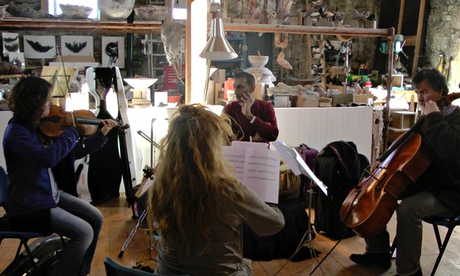
Aberdeenshire’s estimable Sound turns 10 this year and has plenty of reasons to celebrate. This is a festival that clinches that most elusive of ideals: it’s a genuine meeting point of community engagement and contemporary music. The programme happily blurs genre lines in the name of inclusion but doesn’t shy away from hard-hitting new works. Over the past decade, it has energised the arts in north-east Scotland; hopefully the festival’s double digits will bring it the wider recognition it deserves.
Certainly it has been canny at tapping into various funding pots – whether municipal, academic or business. This concert feted the twinning of Aberdeen and Clermont-Ferrand with a collaboration between Sound’s associate ensemble Red Note and Clermont’s string ensemble Orchestre d’Auvergne. Three new works had been commissioned as part of the first world war centenary; also on the programme was Thierry Pécou’s arresting violin concerto Nawpa, its solo part commandingly played by Léonie Delaune. Orchestre d’Auvergne isn’t strictly a contemporary music outfit, but it mostly matched Red Note’s cool precision and brought lushness to the combined sound.
Inevitably the theme made for an earnest, discomforting evening with few moments of light relief. Brian Irvine’s Of the Breathing Land opened with earthy winds, chugged through a motoric section with little contour and subsided into pastel Reichian pulsations. Laurent Cuniot’s Just Before painstakingly imagines the mind of a soldier about to climb out of a first-world-war trench into battle – thoughts first muted through fear, then wild panic, then white lucidity. The most striking work was William Sweeney’s Absence. This underrated Scottish composer combines tangled clarinets, strands of pibroch, haunting, gutsy textures and big-boned elegies for cellist Robert Irvine. The elements are woven in a way that is heartfelt, evocative and never kitsch.

